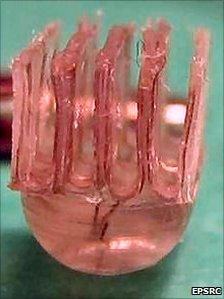Chip implant developed to help the paralysed exercise
- Published

The electrodes close around spinal nerves like a book
A tiny, implantable chip that delivers electrical impulses to aid in exercising paralysed limbs has been unveiled by scientists.
Similar attempts to promote muscle stimulation have been developed before, but have been too bulky to implant.
Thanks to advances in the fabrication of small electronics, the new unit from University College London researchers is smaller than a fingernail.
The implants have a number of other possible uses in muscle rehabilitation.
The devices, called Active Book because they slip around spinal nerves like the pages of a book, deliver electrical impulses directly to the spine from onboard electronics, unlike existing externally-operated devices that apply the impulses to the skin.
"The work has the potential to stimulate more muscle groups than is currently possible with existing technology because a number of these devices can be implanted into the spinal canal," said Andreas Demosthenous, the University College London researcher leading the effort.
"Stimulation of more muscle groups means users can perform enough movement to carry out controlled exercise such as cycling or rowing."
Pilot studies of the Active Book should begin next year, according to the Engineering and Physical Sciences Research Council.